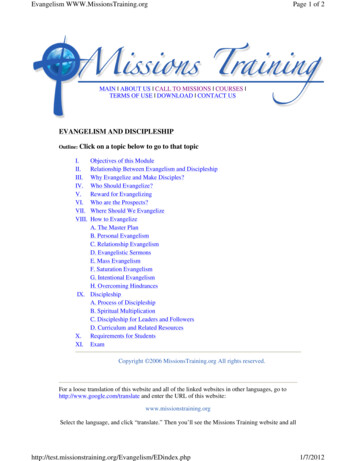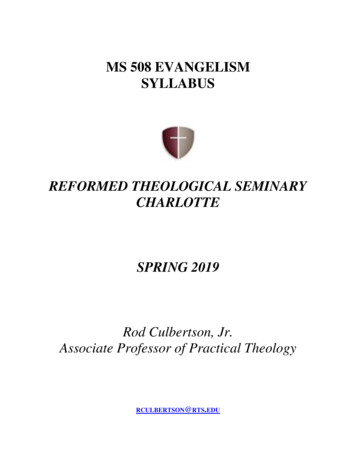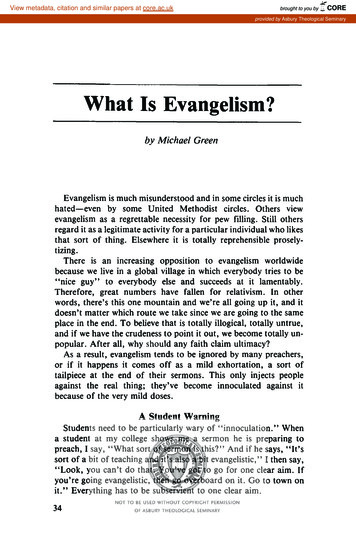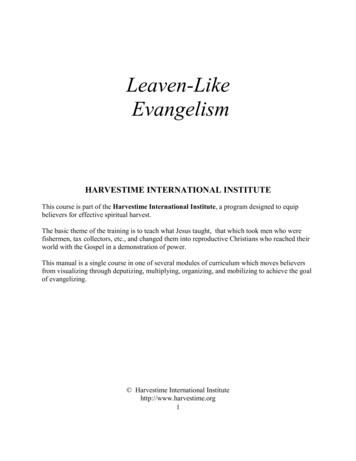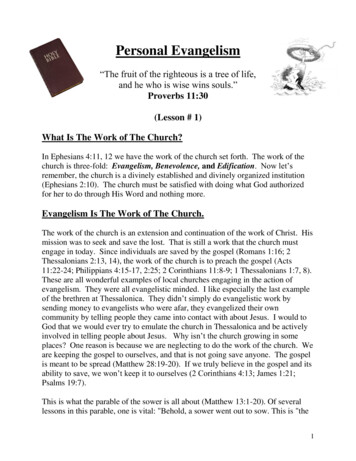
Transcription
Personal Evangelism“The fruit of the righteous is a tree of life,and he who is wise wins souls.”Proverbs 11:30(Lesson # 1)What Is The Work of The Church?In Ephesians 4:11, 12 we have the work of the church set forth. The work of thechurch is three-fold: Evangelism, Benevolence, and Edification. Now let’sremember, the church is a divinely established and divinely organized institution(Ephesians 2:10). The church must be satisfied with doing what God authorizedfor her to do through His Word and nothing more.Evangelism Is The Work of The Church.The work of the church is an extension and continuation of the work of Christ. Hismission was to seek and save the lost. That is still a work that the church mustengage in today. Since individuals are saved by the gospel (Romans 1:16; 2Thessalonians 2:13, 14), the work of the church is to preach the gospel (Acts11:22-24; Philippians 4:15-17, 2:25; 2 Corinthians 11:8-9; 1 Thessalonians 1:7, 8).These are all wonderful examples of local churches engaging in the action ofevangelism. They were all evangelistic minded. I like especially the last exampleof the brethren at Thessalonica. They didn’t simply do evangelistic work bysending money to evangelists who were afar, they evangelized their owncommunity by telling people they came into contact with about Jesus. I would toGod that we would ever try to emulate the church in Thessalonica and be activelyinvolved in telling people about Jesus. Why isn’t the church growing in someplaces? One reason is because we are neglecting to do the work of the church. Weare keeping the gospel to ourselves, and that is not going save anyone. The gospelis meant to be spread (Matthew 28:19-20). If we truly believe in the gospel and itsability to save, we won’t keep it to ourselves (2 Corinthians 4:13; James 1:21;Psalms 19:7).This is what the parable of the sower is all about (Matthew 13:1-20). Of severallessons in this parable, one is vital: "Behold, a sower went out to sow. This is "the1
parable of the sower" (Matthew 13:18), not just the hearers. For both His disciplesand the multitudes, Jesus taught a basic lesson about His kingdom: itsestablishment and growth would be accomplished through teaching. Why?Because faith cometh by the word of God (Romans 10:13-17). LET’S PREACHTHE WORD!Questions1. List at least five reasons why some do not teach others and engage in personalevangelism?2
Personal Evangelism“The fruit of the righteous is a tree of life,and he who is wise wins souls.”Proverbs 11:30(Lesson # 2)Why Study Personal Evangelism?Personal evangelism is important, and it is needful to raise this question, "Whystudy personal evangelism?" Certainly, if our time could be used more profitablystudying something else we should do so. Congregation should be active inpersonal evangelism. If so, we should be thankful. Many local churches howeverare not active in personal evangelism. If you feel personal evangelism is mentionedor studied too frequently you might think about the admonition of Paul not to"grow weary in well doing" (Gal.6:9). Remember, the Lord's church is a savinginstitution (l Tim. 3: 15). While religious denominations view the function of thechurch as primarily benevolent, political, social, or philanthropic, we should notsuccumb to such misconceptions. Jesus first and foremost came to seek and savethe lost. While he was sympathetic to hunger by providing loaves and fishes, herebuked those who followed him for that purpose. It is absurd to have and trainfishermen who don't fish, or to have and train sowers who don't sow seed (Mk.1:17; Lk. 8:11). Once more, "For I came not to judge the world, but to save theworld" (Jn. 12:47). We need to study personal evangelism because that is inessence what being a Christian is all about.We Must Grow.God expects us to grow and mature spiritually. " . as newborn babes, desire thepure milk of the word, that you may grow thereby," (1 Pet.2:2). Growth mustcontinue over a lifetime. Soul winning is one of many ways to grow and bear fruit."But the fruit of the Spirit is love, joy, peace, longsuffering, kindness, goodness,faithfulness, gentleness, self-control. " (Gal.5:22-23). What better fruit is therethan precious souls being added to the Kingdom? The Lord expects his branches tobear fruit. "I am the vine, you are the branches. He who abides in Me, and I in him,bears much fruit; for without Me you can do nothing. If anyone does not abide inMe, he is cast out as a branch and is withered; and they gather them and throw3
them into the fire, and they are burned" (Jn. 15:5-6). The responsibility is placedupon each of us by the general teaching in the Great Commission to be active inpersonal evangelism.The parable of the fig tree illustrates the Lord's disappointment when there is nofruit. He also spoke this parable: "A certain man had a fig tree planted in hisvineyard, and he came seeking fruit on it and found none. Then he said to thekeeper of his vineyard, 'Look, for three years I have come seeking fruit on this figtree and find none. Cut it down; why does it use up the ground?" (Lk.I3:6-7).While preachers must indeed do their part, it is clear that every Christian has a roleto play in the process of evangelism. It was Paul's admonition that we, ". becomeblameless and harmless, children of God without fault in the midst of a crookedand perverse generation, among whom you shine as lights in the world, holdingfast the word of life, so that I may rejoice in the day of Christ that I have not run invain or labored in vain" (Phil.2:15-16). Soul winning should be the natural resultof maturing in the faith.We Must Keep Our Brother.God also expects us to care for others. When God asked Cain, "Where is Abel thybrother?", Cain arrogantly challenged God saying, "Am I my brother's keeper?"(Gen. 4:9). Society today echoes the sentiment of Abel. In a sense every man has aresponsibility to take care of himself, true enough. And to some extent an argumentcould be made that someone who makes no attempt to take care of himselfdeserves to perish. Admittedly, it is an awesome task to take care of oneself. Everyman is responsible for his own sins and we could not, even if we so desired, securethe salvation of another. In fact, it would be very wrong to make vows for someoneelse. But, to a very high degree, we are our brother's keeper. The fact that all ofhumanity is made in the image of God with an eternal soul places us in a uniqueposition with respect to all humanity. In a real sense everyone under heaven is myneighbor."Since God is Father and men are His sons, they are therefore brethren ofone another. As sonship is the most essential factor in man's right relation toGod, so is brotherhood in his relation to his fellow-man. Brotherhood is firstknown as the relation between sons of the same parent, a relation of tenderaffection and benevolence. It becomes gradually extended to kindred, and tomembers of the same tribe or nation. And the Christian ideal of society isthat a similar relation should exist between all men without limit ordistinction. Agape, 'love' is the word in the New Testament that generally4
denotes this ideal. 'Thou shalt love thy neighbor as thyself' is the whole lawof conduct as between man and man (Mt. 22:39-40); and neighbor includesevery man within one's reach (Lk 10:29ff), even enemies (Mt. 5:44; Lk.6:35). Without the love of man, the love of God is impossible, but 'he thatabideth in love abideth in God' (1 Jn 4: 16,20)" (International StandardBible Encyclopedia).Yes, we are our brother's keeper. The whole example of Jesus teaches that we must"keep" (take care of) our brother. In fact, the Lord will call us into account as hedid in the case of Cain as to the condition of our brother. Love requires concern forour brother.We Must Care For the Lost.One of the greatest expressions of love we can show anyone is to tell that oneabout Christ. James put it this way, "Brethren, if anyone among you wanders fromthe truth, and someone turns him back, let him know that he who turns a sinnerfrom the error of his way will save a soul from death and cover a multitude of sins"(Jas.5:19-20). Paul thought of himself as a debtor to anyone he had not reachedwith the gospel. "I am a debtor both to Greeks and to barbarians, both to wise andto unwise. So, as much as is in me, I am ready to preach the gospel to you who arein Rome also. For I am not ashamed of the gospel of Christ, for it is the power ofGod to salvation for everyone who believes. for the Jew first and also for theGreek" (Rom.1 :14-16). According to W.E. Vine, the word debtor is from theGreek word opheiletes, meaning "'one who owes anything to another,' primarily inregard to money" (Vine's Expository Dictionary of NT Words, 150). It is usedmetaphorically by Paul in Romans 1:14 in the matter of preaching the gospel.Paul felt a strong debt to deliver the gospel message to the lost. He responded tothis indebtedness by sharing the gospel with others. So much so that he told theEphesian elders he was free from the blood of all men. " . how I kept back nothingthat was helpful, but proclaimed it to you, and taught you publicly and from houseto house . Therefore I testify to you this day that I am innocent of the blood of allmen" (Ac.20:20,26). Paul really saw no alternative to reaching the lost. "For if Ipreach the gospel I have nothing to boast of, for necessity is laid upon me; yes,woe is me if I do not preach the gospel!" (1 Cor.9:16).George Stebbins penned these words to challenge the unfruitful: “Must I go, andempty handed, Thus my dear redeemer meet? Not one day of service give him,Lay no trophy at his feet? Must I go and empty handed? Must I meet my savior so?5
Not one soul with which to greet him: Must I empty handed go?” Really, we haveno choice. We cannot help but be soul winners. Jeremiah thought once he mightnot speak of the Lord. "Then I said, 'I will not make mention of Him, Nor speakanymore in His name.' But His word was in my heart like a burning fire Shut up inmy bones ;I was weary of holding it back, And I could not" (Jer.20:9). Yet, it wasin his bones to teach others about the Lord.We Must Be Teachers.God expects us to be teachers. The author of Hebrews had in mind some who hadnot developed as they should. He wrote, "For though by this time you ought to beteachers, you need someone to teach you again the first principles of the oracles ofGod; and you have come to need milk and not solid food" (Heb.5:12). We mustseek out faithful men and encourage them to learn to teach others. "And the thingsthat you have heard from me among many witnesses, commit these to faithful menwho will be able to teach others also" (2 Tim. 2:2).Questions1. What is, and is not, the mission of the Lord's church?2. Discuss the situation of a fisherman who will not fish and a sower who will notsow.3. How does personal evangelism relate to bearing fruit? Are there some otherways that one can bear fruit in the kingdom besides converting people?4. How does the Lord react when He finds no fruit at all?5. List some ways in which I am not "my brother's keeper."6
6. List some ways in which I am "my brother's keeper."7. What responsibility do we all have as "sons of God" toward our fellow-man?8. What benefit comes from converting a sinner from the error of his way?9. Why would Paul consider himself a debtor to those who had not heard thegospel?10. What was Paul's assessment of his effort of preaching the gospel at Ephesus?11. How did Jeremiah react to his responsibilities to teach the wayward?12. What was the fundamental problem with some Christians in the NT accordingto Hebrews 5:12?13. Describe how the chain of teaching works based on Paul's instructions in 2Timothy 2:2.14. What four responsibilities are discussed in this lesson which encourage us to domore personal evangelism?7
Personal Evangelism“The fruit of the righteous is a tree of life,and he who is wise wins souls.”Proverbs 11:30(Lesson # 3)Evangelism and PurposePersonal evangelism certainly is important. In fact, a congregation of God's peoplecannot hope to be accepted by Him and neglect this important area. On the day ofPentecost Peter gave emphasis to this responsibility. "Then Peter said to them,'Repent, and let every one of you be baptized in the name of Jesus Christ for theremission of sins; and you shall receive the gift of the Holy Spirit' . Then thosewho gladly received his word were baptized; and that day about three thousandsouls were added to them . praising God and having favor with all the people.And the Lord added to the church daily those who were being saved" (Acts2:38,41,47). The procreation of the kingdom of God depends on evangelism. TheApostles' task on the day of Pentecost was to evangelize. That task was driven by aprimary purpose. Their purpose was conversion. You see for men to be saved theymust be radically changed. It is good that brethren recognize that purpose and settleon the noble objective of reaching the lost. When they do this they will reach theircommunity as a field white for the harvest. Jesus said,"Do you not say, 'There are still four months and then comes the harvest'? Behold,I say to you, lift up your eyes and look at the fields, for they are already white forharvest!" (John 4:35).What Is Our Purpose?However, to have tunnel vision and ignore the broad scope of the Lord's work byfocusing in on evangelism alone is counter-productive. By such improper focus acongregation so doing neglects to build the base needed to nurture and cultivate itsfruits. To improperly focus on evangelism while ignoring other areas would be likethe person Paul spoke of who had all faith, yet was nothing because he did not havelove. "And though I have the gift of prophecy, and understand all mysteries and all8
knowledge, and though I have all faith, so that I could remove mountains, but havenot love, I am nothing" (l Cor. 13: 2).The apostle Peter reveals the various facets of the New Testament church in Acts2. Study the chart on the next page and notice how each area of responsibility isdesignated. Then note the purpose of each area along with the task of carrying outeach purpose.Jerusalem ChurchTaskPurposeActs 2:42,47They devoted themselves tothe breaking of bread and toprayer praising God.Exalt GodWorshipHeb.13:15Rom.15:111 Cor.11:23-29Eph.5:19Acts 2:42,44,46They devoted themselves tothe fellowship. All thatbelieved were together Andthey continued daily with oneaccord.Acts 2:42,44,46They devoted themselves to theapostles teaching.EncourageFellowshipEph.4:161 Cor.12:12-271 Jn.1:72 Cor.8:4Train & EquipEdifyEph.6:10-162 Tim.4:1-4Relieve2 Tim.2:2Heb.5:121 Tim.3:15ServiceAnxious- Phil.4:6Fearful- 1 Jn.4:18Poor- Mt.26:11Mt.25:33-461 Cor.16:1-2Rom.15:26Acts 2:44-45All the believers were togetherand had everything in common.Selling their possessions andgoods, they gave to anyone ashe had need.Acts 2:38,41,47EvangelizeRepent and be baptized, everyone of you, in the name of Jesus Mk.16:16Christ for the forgiveness ofMt.28:19-20your sins. Those whoaccepted his message werebaptized, and the Lord addedto their number daily those whowere being saved.ConvertActs 3:19Mt.18:3The work of the church is threefold: edification, benevolence, and evangelism(Eph. 4: 12). The five purposes detailed chart fit into these three categories. If not,9
they would be unscriptural. It would serve a congregation well to consider itspurpose before a strong program is planned, even in personal evangelism. Onecongregation might be strong in personal evangelism, but have a poor Bible classprogram, be indifferent to ministering to the needy, or conduct a worship servicethat is not as reverent and holy as it ought to be. And all the while this samecongregation may be totally indifferent to the gospel being preached anywhereexcept in the immediate area.The sad thing is that some churches are recognized as being "commendableworks", yet closer examination reveals that they are often doing well in only one ofthe five purposes listed above. For instance, you may find a church that has atremendous worship service with an accomplished song leader and pulpit speaker(see task number one).At the same time, you may find another congregation that is known for its closefellowship as the members worship together and edify one another (see tasknumber two). Perhaps they have strong teacher training programs, training classesfor the men to learn to make talks, preach and serve, and even a ladies' Bible classthat affords the women the opportunity to be encouraged by the fellowship of oneanother.Then, there may be a church that has an ambitious Bible study program, completewith trained teachers following a well-planned curriculum and access to activitiesobtained from a well equipped resource room (see task number three).Or, you may come across a congregation that is known for its ministry (see tasknumber four). This type of congregation is often in a community that has a lot ofmembers that hurt in various ways. Some members may be poor, while otherscould be handicapped or even lonely. A mind to work and minister to thesebrethren is evidenced when the members meet to sing and read Scripture at thelocal nursing homes. The church may even have a “prison ministry” in progress aswell.And finally, you may have a congregation that is very active in evangelism (seetask number five). The members may have several trained Bible teachers who arecapable of using the Jule Miller or other series. Someone there may even be able topresent home Bible studies. Their preacher may have made several trips to othercountries, while the congregation supports preachers outside the local congregationand sometimes even preachers in other countries for example.10
Are We Balanced?It is unusual to find a congregation that functions well in all of these areas andfulfills completely the purpose of the Lord's church in all five areas detailed inActs 2. If the congregation continues a program that is so out of balance it oftenbecomes the victim of the temptations and dangers of such direction.Concentrating on the worship service improperly and neglecting the other areashave led to solos and choirs and undue exalting of preachers. Concentrating onBible classes improperly and neglecting other areas have led to competitiveclassroom "decorations" and a waste of the Lord's money. An undue concentrationon ministry has lead to a "Red Cross" concept of the church seeing the relieving ofthe physical pains of the world as the church's primary objective. Those undulyfocusing on evangelism at the expense of other purposes lead to the culticmovements that enslave members to follow members for evangelism and condemnharshly those who fail to meet their man made quotas.Putting personal evangelism in the right perspective requires balance. It recognizesthat God intended His church to be evangelistic, to be edifying and to be sensitiveto the hurting. God also desires the assembly of the saints to be a grand occasion toworship God. An intense effort should be made by the congregation to fulfill God'spurpose in every area, not just personal evangelism.Most of us would concede that all of the five purposes mentioned in the chart onthe previous page are scriptural and are the responsibility of the local church(assuming they are not abused and carried out at the expense of other areas). Thedifference comes when we examine what a congregation is actually DOING."Wherefore you shall know them by their fruits" (Mt. 7:20).Questions1. The procreation of the kingdom depends upon what?2. What was the Apostle Peter's task on the day of Pentecost?11
3. What is the danger of becoming too focused on personal evangelism?4. What is the three-fold work of the local church?5. Give the five purposes of the church listed in the chart and the scripturalreference where they are found in Acts 2.6. From the chart, identify the task of each purpose and give the content of at leastone passage that identifies that task.7. Define evangelism and give several examples of local church evangelism.8. Define edification and give several examples of local church edification.9. Define benevolence and give several examples of local church benevolence.10. Explain how a congregation might well enjoy a good reputation amongbrethren, while not having the favor of the Lord. Refer to points made in the lessonand Rev. 2: 1-4, 3: 14-18.12
Personal Evangelism“The fruit of the righteous is a tree of life,and he who is wise wins souls.”Proverbs 11:30(Lesson # 4)DiscipleshipWhen Jesus began his earthly ministry he chose disciples. These early discipleslater became the twelve Apostles designated for a special work. Jesus laterdescribed all his followers as his disciples. The Greek word mathetes from whichwe get our word disciple means "a learner." It "denotes 'one who follows one'steaching,' as the 'disciples' of John, Mt. 9:14; of the Pharisees, Mt. 22:16; of Moses,John 9:28" (Vine's Expository Dictionary of NT Words, 171). The Apostles wereprepared for a special work. They were to receive the promise of the Holy Spirit onthe Day of Pentecost (Acts. 1:4,2:1-4) and bind on earth what had been bound inheaven (Matt. 18:18). Jesus spent three years with the Twelve teaching andtraining them for a commission that would be described as sitting upon twelvethrones judging the twelve tribes of Israel (Mt. 19:28). Today, under the banner of"discipling," some have mistakenly sought to subjugate men to their charge byteaching that converts must subject themselves to their religious leaders just as theApostles were subject to Jesus in His day. Two things are wrong with thisassumption: (1) today's religious teachers are not the Lord Jesus Christ who in thedays of the NT chose the Twelve, and (2) the special work the Apostles werecalled to do has already been done.The disciples in the NT, who were not Apostles, were simply "learners," followingtheir "teacher" the Lord Jesus Christ. This is clear from the results that came frompreaching the gospel in the book of Acts. "And the word of God increased; and thenumber of the disciples multiplied in Jerusalem greatly; and a great company ofthe priests were obedient to the faith" (Acts. 6: 7).Love of the SaviorFirst and foremost, a disciple must have a love of the Savior. The apostle Peteremphasizes this attribute as a prerequisite of those who would prepare themselves13
to teach others. "But sanctify the Lord God in your hearts: and be ready always togive an answer to every man that asketh you a reason of the hope that is in youwith meekness and fear" (1 Pet. 3:15).We are sometimes ineffective in rallying others to be workers for the Lord becausewe seek to get others to tell about a Lord that they do not know themselves. Thosewho love the Lord with all their heart, soul and mind will have no problem sharingtheir faith with others no matter how awkwardly their message is presented. Whena young man proposes to the one he has chosen to share his life with, sheunderstands his message even if poorly presented. His love for her is apparent andshe is graciously complimented. Similarly, a disciple of the Lord who hassanctified Jesus in his heart, will present the risen Lord well (assuming he hasmade preparation no matter what lesson he presents, Bible study or otherwise).When we love the Lord we wind up talking about Him.Disciples who love the Lord cannot help but teach others about Him. They will feelas Jeremiah did in his day. "O Lord, thou hast deceived me, and I was deceived:thou art stronger than I, and hast prevailed: I am in derision daily, every onemocketh me. For since I spake, I cried out, I cried violence and spoil; because theword of the Lord was made a reproach unto me, and a derision, daily. Then I said,I will not make mention of him, nor speak any more in his name. But his word wasin mine heart as a burning fire shut up in my bones, and I was weary withforbearing, and I could not stay" (Jer. 20:7-9).Faith in the MessageSecond, a disciple must have a deep faith in the message of the gospel to becomean effective personal worker. This message is eternal. While God, man, sin and thedevil have not changed, society and technology continue to change. But amongthese changes, our mission to seek and save the lost cannot change. Our methodsof presenting the message will change from time to time, but a different methodmay not necessarily be better. What is "better" is what is right and what works. Themessage is to be taught whether it is accepted or not. One great encouragement isknowing that not everyone will accept it. Jesus, near the close of his personalministry found it necessary to explain the apparently small response to histeaching. He reminded the people of Isaiah's prophecy that the day would come inwhich the workers would wonder aloud, "Who hath believed our report?" In otherwords, they were saying to Jesus, "Lord, is this all?" Yet Jesus was a complete14
success in what he did. The increase of converts is the Lord's part. We plant andwater, the Lord gives the increase (l Cor. 3:6).Ezekiel was sent to the lost sheep of Israel. He was not sent to those of a strangelanguage or culture. He was told that they would not hear him, yet he was to goanyway. If he failed to teach the wicked he would perish with the wicked. If hetaught the righteous he would save himself as well as his hearers. But whether theychose to hear or they chose to forbear they would know that there had been aprophet among them (Ezek. 2:5; 3:4-7,17-21).J.B. Phillips' translation of 1 Corinthians 1: 17 reads this way: "Christ did not sendme to see how many I could baptize, but to proclaim the gospel." Some in the NTera reacted with angry hostility to the preaching of the gospel (Ac. 9:23, 25; 18:56; 19:8-9, etc.). Others were interested, but did not immediately obey (Ac. 24:25;26:27-28, etc.). Many believed and obeyed the gospel (Ac.2:41; 4:4; 5: 14; 6:7;etc.). All three reactions are found in Acts 17:32-34. It is clear that if we teach thegospel, whatever the apparent results, we will please the Lord. If we do not teachit, we can only expect condemnation.Concern for the LostThird, a disciple must have a deep concern for the lost people who are lost in sinand who face eternal torment. We should be horrified at the thought that someonewe know is going to hell. Jonah did not go to Nineveh because he was afraid ofthem. Examine what the record says: "Then said the Lord, Thou hast had pity onthe gourd, for the which thou hast not labored, neither madest it grow; which cameup in a night, and perished in a night: And should not I spare Nineveh, that greatcity, wherein are more than six score thousand persons that cannot discernbetween their right hand and their left hand; and also much cattle?" (Jonah 4:1011). Jonah was afraid that the Ninevites might repent and God would spare them.We need to be careful about wanting the wicked to get their due. Our lack ofpersonal evangelism indicates that we do not really believe people are lost andthat we will be lost if we do not take the gospel to them. More of our prayersseem to be "Come Lord Jesus" rather than "Just a little longer . please Jesus .just a few more days to get our loved ones in." Paul expressed his attitude this way:"For I am in a strait betwixt two, having a desire to depart, and to be with Christ;which is far better: Nevertheless to abide in the flesh is more needful for you"(Phil. 1:23-24).15
A young man who died of exhaustion after pulling a number of people to safetyafter a terrible ship wreck, asked, "Did I do my best"? When reassured that he hadsaved 17, his dying reply was, "I know, but If I could have saved just one more." Ina spiritual way this should be the goal of every Christian . Just one more!Mind of the SpiritFinally, a true disciple must have a mind of the Spirit, that is, he must be spiritualor spiritually minded. True disciples walk "after the Spirit" and have the "mind ofthe Spirit" (Rom. 8:4,6). Paul said that the lost were best approached by thespiritual (Gal. 6: 1). He would say that you who are spiritual are going to be thosethat are his disciples. A spiritual person is at peace with his own heart. "And herebywe know that we are of the truth, and shall assure our hearts before him. For if ourheart condemn us, God is greater than our heart, and knoweth all things. Beloved,if our heart condemn us not, then have we confidence toward God" (1 In. 3:19-21).If our heart does not condemn us, we have confidence toward God.Spiritual people are those in which spiritual interests prevail in their lives. Spiritualpeople spend a large portion of their lives hearing gospel preaching, reading theBible and related materials, caring for the needy, visiting those that are in thehospitals and nursing homes, associating with those of like precious faith, talkingabout spiritual things and issues and, yes, seeking the lost. That is not to say thatthey don't enjoy a ball game now and then or recreate in some way, or even a partyonce in awhile. They may even read a good novel or go on a picnic when timepermits. It is just that their whole lives are not dominated by ball games, movies,TV, parties, novels, and picnics. Brethren, if the thrust of our life is focused oncarnal things, even if those things are not wicked within themselves, then we arejust not spiritual. We must have our priorities according to God’s order. “But seekye first the kingdom of God, and His righteousness and all these things shall beadded unto you (Matt.6: 33).Questions1. What does the word disciple mean?2. Give two reasons why we cannot parallel the calling and training of the 12Apostles with discipling as it might be found in the church today.16
3. Give some other names that would be appropriate for disciples in the churchtoday.4. What must one do before he prepares himself to give an answer to someone whoasks about his faith?5. How could one go about "sanctifying th
Personal Evangelism “The fruit of the righteous is a tree of life, and he who is wise wins souls.” Proverbs 11:30 (Lesson # 2) Why Study Personal Evangelism? Personal evangelism is important, and it is needful to raise this question, "Why study personal evangelism



